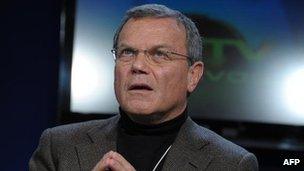Majority of WPP shareholders oppose executive pay deal
- Published

Sir Martin founded WPP in 1985; it is now the world's biggest advertising group
WPP shareholders have voted against the company's executive pay report, which includes a £6.8m deal for chief executive Sir Martin Sorrell, by a majority of 59.5%.
The vote was announced at the advertising agency's annual general meeting in Dublin, but is not binding.
It comes after a number of shareholder advisory bodies urged members to vote against the deal.
WPP is the latest firm to suffer investor discontent over executive pay.
The voting result so far is based on the postal votes of WPP's large institutional shareholders.
Small shareholders attending the AGM in person are now voting at present, but this will have only a very limited effect on the final result.
'More engagement'
Shareholder advisory body Pirc was one organisation that urged members to vote against the deal, citing concerns over its "excessiveness".
Pirc and other bodies highlighted the fact that Sir Martin's pay package was 60% higher than a year earlier.
The BBC's Northern Ireland business correspondent, Jim Fitzpatrick, who was at WPP's AGM, said its shareholders had "delivered a message".
He added: "The company justified their remuneration policies but struck a contrite note by promising a more 'continuous' engagement with shareholders."
Louise Rouse, director of engagement at investment campaigner FairPensions, who also attended the meeting, said: "It is difficult to know whether the WPP board underestimated the level of shareholder anger or simply chose to ignore it."
However, WPP's chairman Philip Lader, told the AGM that the company took the remuneration report vote "very seriously".
He added: "We'll consult with many share owners and will then move forward in the best interests of our share owners and our business."
However, BBC business editor Robert Peston believes WPP's board may need to take more drastic action to restore good relations with shareholders: "Normally in these embarrassing circumstances, someone senior would resign from the board, to bring about a structural improvement in the relationship with the owners."
But he thinks that Sir Martin is unlikely to go: "Presumably it will have to be one or both of the individuals who set his pay, Mr Rosen and Mr Lader."
'Reward performance'
Ahead of the AGM, Sir Martin had defended his pay deal, which comprises a £1.3m salary, a £2m annual bonus and £3m in deferred shares and other benefits.
Sir Martin, who founded WPP in 1985, pointed to the company's £1bn record profit last year, and said he found the controversy over his compensation "deeply disturbing".
Writing in the Financial Times last week Sir Martin said: "WPP has a very independently-minded board and compensation committee, which makes decisions that they believe are in the long-term interests of the company and its shareholders, of which I am one.
Sir Martin Sorrell defends pay deal in October 2011 interview
"The board's compensation decisions are right because they reward performance, not failure, reject options in favour of a long-term incentive scheme with co-investment and five-year performance periods, and are competitively fair against our big US and French competitors, which we consistently outperform."
Others companies who have also recently faced shareholder rebellions include Aviva, Trinity Mirror and AstraZeneca - all of whom announced the departures of their chief executives as a result of investor pressure.
- Published8 May 2012
- Published27 April 2012
- Published1 March 2012